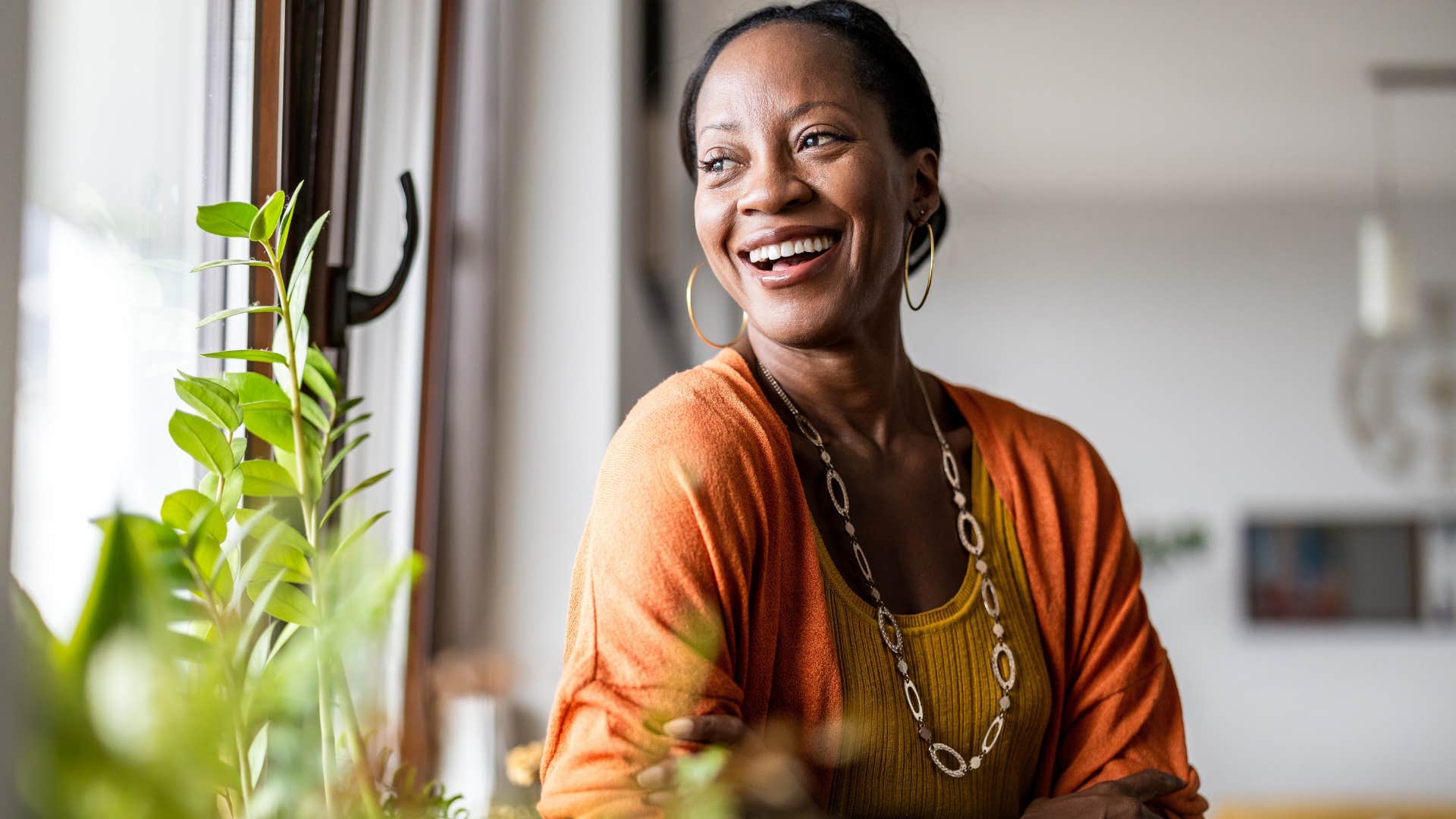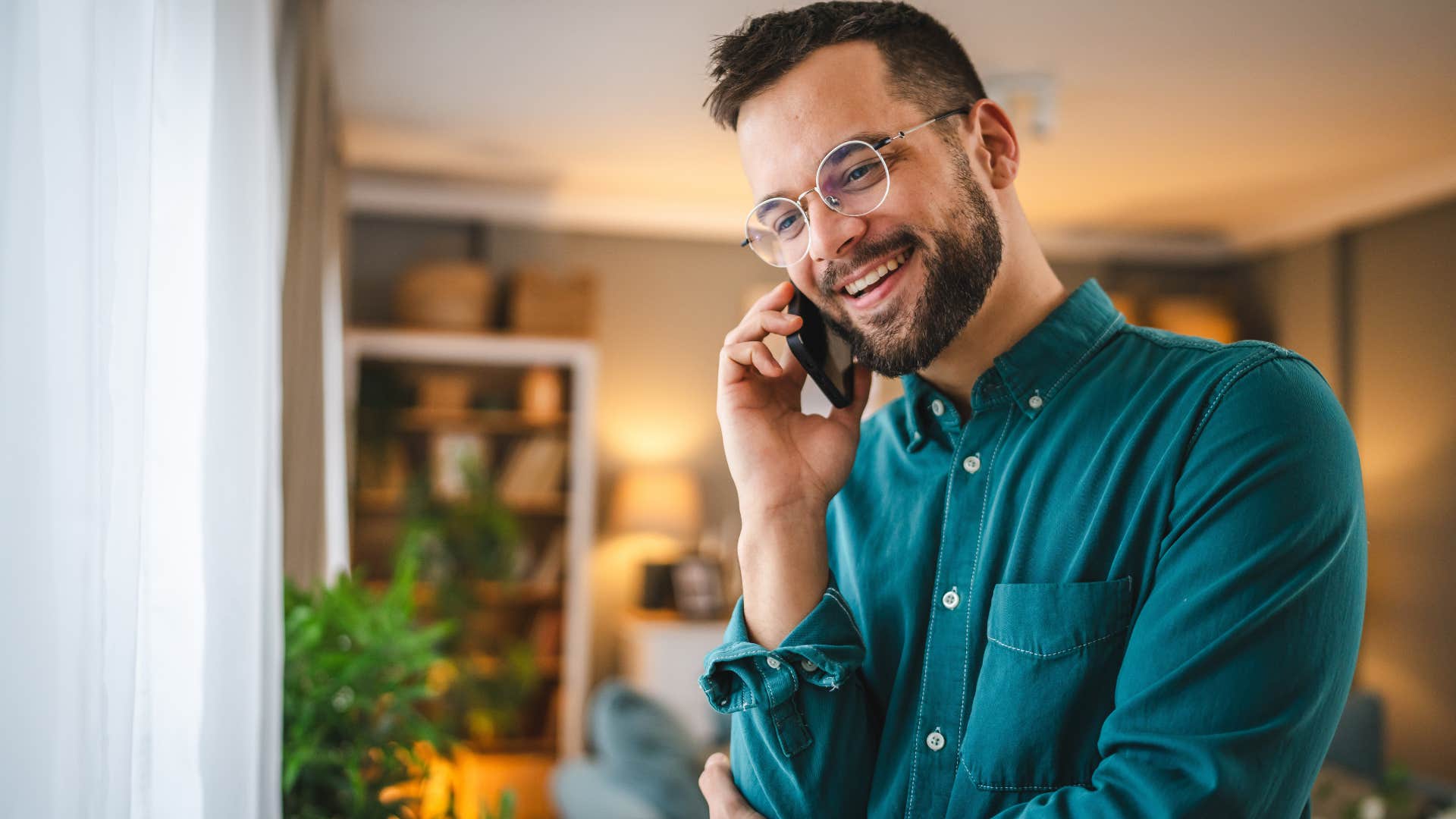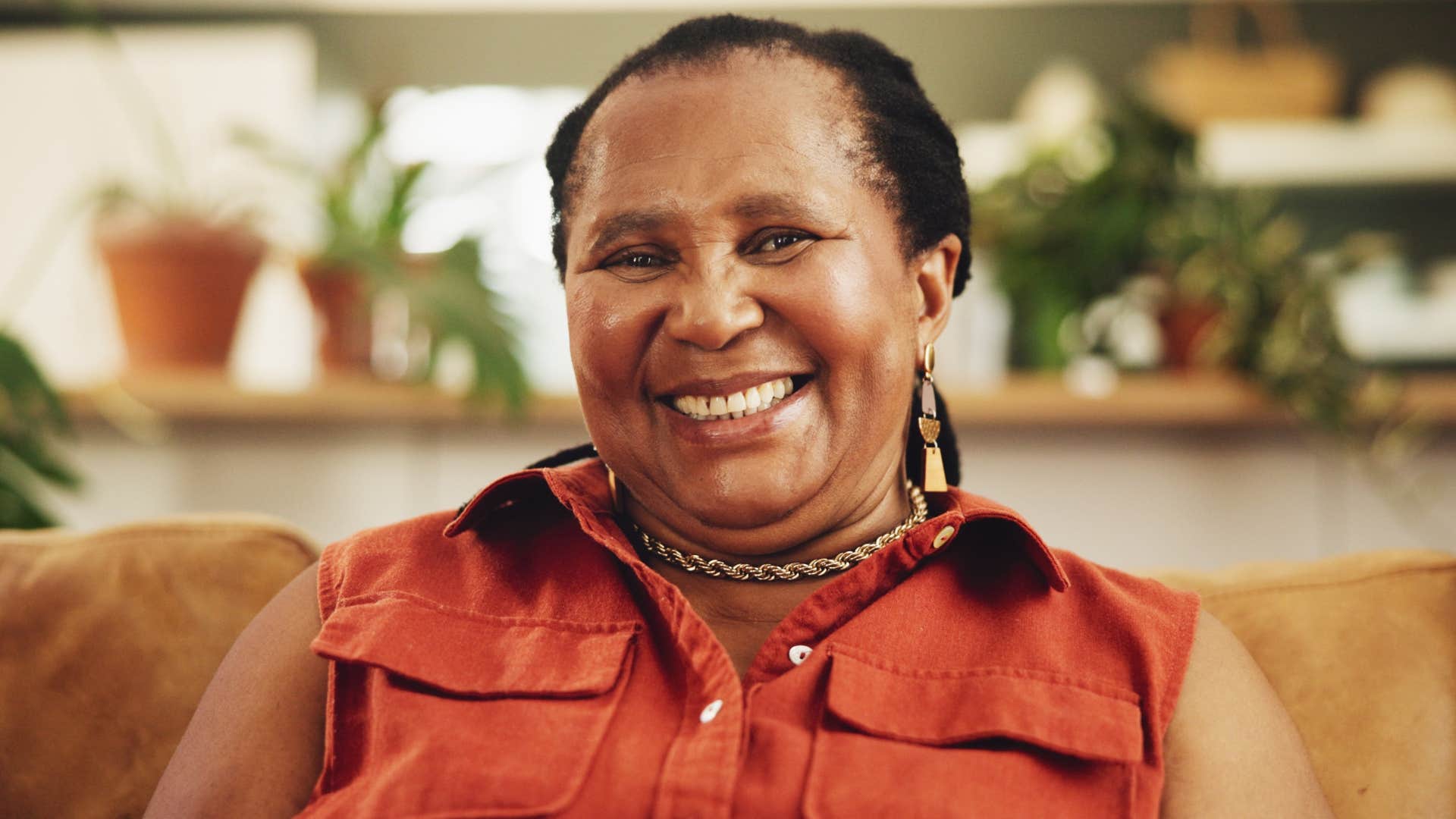11 Things Lucky People Do Way Differently Than Unfortunate Ones, According To Psychology
People aren't born lucky, they just make choices everyday that keep them on top.
 stockfour | Shutterstock
stockfour | Shutterstock While it can spark feelings of envy and frustration to see "lucky" people get everything they want and wish for while you're simultaneously overworking yourself to achieve a certain goal, the truth is that the virtue of "luck" is a choice, not a preordained trait. There are certain things lucky people do way differently than unfortunate people, according to psychology experts, setting them up to manifest new opportunities, better navigate life changes, and look out for themselves amid the chaos of daily life.
By recognizing and adopting the behaviors that truly make "lucky" people lucky, you have the power to take the reins in your own life. You may not be able to control everything that happens to you or the people around you, but you'll always have the autonomy to control how you react and think about change. Shifting your mindset is more powerful and important than many people recognize — with the right one, you can live a happier, more fulfilling, and empowered reality.
Here are 11 things lucky people do way differently than unfortunate people, according to psychology
1. They love talking to strangers
 Cast Of Thousands | Shutterstock
Cast Of Thousands | Shutterstock
From boosting their social confidence, to helping them feel seen, and even building bridges to new communities and a sense of important belonging, as research from American Economic Review determined, lucky people's openness to conversations and interactions with strangers often presents them with opportunities they'd otherwise miss out on.
It might seem cliché, but there's a reason why people say "It's all about who you know." From learning more about yourself to finding professional opportunities, the connections you have and the people you know can truly make all the difference.
The person you spoke to in line at the coffee shop might only give you a laugh or a boost of confidence during the day, but they could also be the gateway to a larger, more life-altering opportunity like a new job.
By remaining open and excited about connecting with strangers, lucky people put themselves in a position to find new opportunities and learn things about themselves that the average person might never know. By leading with empathy in these conversations, rather than expecting a transactional interaction to occur, you can leverage the power of social connection to embrace "lucky" energy.
2. They regularly use affirmations
 Jacob Lund | Shutterstock
Jacob Lund | Shutterstock
"Everything always works out for me, because I'm incredibly lucky" — it might seem like a silly affirmation to tell yourself everyday, but psychology experts suggest it truly can help you to manifest what you want and need into your life. Dr. Carol Dweck, a professor at Stanford University, argues that believing we're capable of achieving something genuinely supports our practical ability to achieve it.
By using affirmations to reinforce their self-confidence and self-worth — believing they have the ability to achieve something — lucky people set themselves up for success.
Whether it's affirming themselves of their standards while dating, encouraging themselves to show up at work, or overpowering their inner critic with phrases like "I'm worthy of love and space," affirmations are one of the things lucky people do way differently than unfortunate people, according to psychology.
Even just using an affirmation like "I'm lucky" before starting your day can help to introduce this irresistibly magnetic energy into your life, urging other people to believe and find comfort in the security, confidence, and intelligence you're adopting.
3. They trust their intuition
 G-Stock Studio | Shutterstock
G-Stock Studio | Shutterstock
Considering people who are "lucky" often subconsciously manifest the things they want into their lives, they're innately intuitive and self-aware. They not only know what they want and are able to verbalize it, they maintain a healthy and trusting relationship with themselves by taking care of their physical bodies and listening to their intuition.
While our intuition — based on prior experiences, anxieties, and beliefs — can sometimes be misguided and unproductive, shielded by anxiety or fear, according to neuroscientist Joel Pearson, it can also be productive, reminding us of unconscious information that we may not be presently aware of.
Self-aware people also tend to be "lucky" because they provide a spotlight for their intuition to shine in the right moments — steering them away from toxic situations, relationships, and experiences, towards things that empower, challenge, and uplift them.
Lucky people show up for themselves, confident in their ability to navigate challenges and trust their gut. Even amid the mundanity of life — doing laundry, committing to productivity at work, and taking care of their mental health — they show up for themselves, building a trusting relationship that prioritizes intuition, self-care, and support.
4. They're not overly reliant on labels
 pikselstock | Shutterstock
pikselstock | Shutterstock
While labels and self-proclamations of personality can be incredibly helpful for building self-worth, reinforcing our identity, and finding a sense of belonging and community in certain situations, adopting terms like "introvert" can actually be unlucky, according to psychologist Dr. Benjamin Hardy in his book "Personality Isn't Permanent."
Specifically for "introverts," adopting this label in conversation with others can isolate us from meaningful conversations and discomfort that could otherwise bring opportunities our way.
Considering one of the things lucky people do way differently than unfortunate people, according to psychology experts like Tim Denning, is to seek out opportunities hiding in plain sight, adopting labels that shield us from healthy challenges and discomfort can be limiting.
Rather than adopt limiting labels and latch onto personality traits that aren't always a reflection of their entire being, lucky people show other people who they are, focusing on connection and leading with empathy.
5. They embrace change
 Bricolage | Shutterstock
Bricolage | Shutterstock
Although unexpected change and challenge can be uncomfortable to navigate, even for extremely self-aware and intelligent people, lucky people embrace trying new things and getting out of their comfort zone.
They not only give themselves the grace to be bad at things and feel uncomfortable in new situations, they seek out challenges, reinforcing the idea that they have control over their future and fate.
As psychiatrist John Sharp explains in his TEDx talk on limiting beliefs, the stories and critical beliefs we hold about ourselves truly do have the power to hold us back. "It's the story you've been telling yourself about who you are and how everything always plays out," he said.
When you consistently tell yourself that "you can't" or that a challenge "is impossible," you limit yourself from healthy change, adopting a misguided truth that you're not the one in control of your life.
Lucky people know they have the power to change their own lives, but they also learn to be comfortable with the unexpected change that encourages them to let go of control and go with the flow. You don't have control over everything, but you do have control over your thoughts — don't make your mind an uncomfortable place to deal with grief, discomfort, and change.
6. They're radically optimistic
 Miljan Zivkovic | Shutterstock
Miljan Zivkovic | Shutterstock
Psychologist Richard Wiseman's study on lucky habits in his book "The Luck Factor" found that truly lucky people are biased toward optimism in their daily lives. Rather than suppress their dreams and goals with self-limiting beliefs, they expand their world view by dreaming big and embracing challenges.
When they're interacting with others, they don't let rumors, labels, or misguided biases sabotage their connections and reality — they live in the present moment. Optimism is powerful, especially when it's used thoughtfully to help craft goals and motivate aspirational language.
7. They acknowledge the 'worst case scenarios'
 Perfect Wave | Shutterstock
Perfect Wave | Shutterstock
Being intentionally resilient is one of the things lucky people do way differently than unfortunate people, according to psychology experts like Wiseman. When they're faced with challenges or even "bad luck" in their lives, they don't shy away from acknowledging the "worst case scenario"; in fact, they make space for those uncomfortable thoughts to affirm and reassure them that they're able to overcome any obstacle.
"They tend to imagine spontaneously how the bad luck they encounter could have been worse and, in doing so, they feel much better about themselves and their lives," Wiseman argues in his book. "This, in turn, helps keep their expectations about the future high and increases the likelihood of them continuing to live a lucky life."
Other people stuck in stagnant routines and bad habits view adversity as a setback, while lucky people embrace it — seeking out opportunities to learn, grow, and connect with others, even when they're struggling in other capacities.
By acknowledging what could have been the "worst case scenario" in unfortunate or annoying situations, truly lucky people are able to put the good in perspective.
8. They acknowledge their anxiety and fear
 Mimagephotography | Shutterstock
Mimagephotography | Shutterstock
Especially in today's society that's hyper-focused on eradicating discomfort and pain, it's not uncommon for people to suppress their emotions and actively work to "solve" the symptoms of their anxiety and fear in the name of self-care. However, suppressing discomfort isn't the key to taking great care of yourself or even becoming truly lucky, it only adds fuel to the fire of internal confusion, resentment, and exhaustion.
Lucky people that have the capacity to be intentionally self-aware and present in their daily lives often take the time to address the root causes of their anxiety and discontent, rather than instantly solve symptoms like fatigue, irritability, or isolation.
Lucky people have already built a trusting relationship with themselves — both physically and emotionally — that encourages them to stop and assess when they're experiencing discomfort.
By assessing the root cause of their symptoms, finding ways to mediate them in the current moment, and coming back to reflect, like experts from Harvard Health suggest is the best cycle for addressing anxiety, they make space to be present in their life and open to the joys, opportunities, and beauty it has to offer.
9. They speak intentionally about their goals
 fizkes | Shutterstock
fizkes | Shutterstock
If you're working towards a promotion at work, but never voice what you're hoping to achieve, how can you expect to get in front of the right person or get your goals on their radar? Lucky people are intentional about who they speak about their goals with and how they choose to verbalize them — acknowledging the power of manifestation and pure luck in achievement.
There's a delicate balance between speaking too often or prematurely about your aspirations and speaking them intentionally into the universe. People who boast too early or often about their goals, without any intention behind these conversations, can sabotage their progress and productivity, according to psychologist Marwa Azab.
However, unfortunate people who never achieve their goals may not have spoken about them enough, missing out on unsuspecting opportunities or integral teaching moments that could have given them the tools to succeed.
10. They embrace their imperfections
 PeopleImages.com - Yuri A | Shutterstock
PeopleImages.com - Yuri A | Shutterstock
While the average person might fret often over their shortcomings or ruminate on their mistakes, lucky people live in the present moment by embracing their imperfections. Rather than letting anxiety and bad habits sabotage their connections and self-worth, they find ways to acknowledge the places they need to grow without letting it take over their entire lives.
However, the self-awareness that lucky people have isn't just about considering what they're doing wrong, it's also about making space for acknowledging what they do well. By investing in healthy habits like regular journaling, lucky people combat the anxiety and mental distress that clouds unfortunate people, building their self-worth and adding purpose to their sometimes mundane routines.
11. They act on their curiosity
 Prostock-studio | Shutterstock
Prostock-studio | Shutterstock
While studies, like one from the Journal of Individual Differences, suggest that curiosity is linked to intelligence, it's also one of the things lucky people do way differently than unfortunate people, according to psychology.
Innately curious about the world, people, and unique situations around them, lucky people make an effort to follow through on their curiosities — committed to learning new things, putting themselves in challenging situations, and connecting with people they'd otherwise avoid.
By embracing a mindset shift about curiosity, lucky people often open up opportunities and meet people that fundamentally change their lives. Whether it's a passing interaction that boosts their self-esteem, a teaching moment that offers up a new skill, or a conversation that sheds new light on their purpose, seeking out curiosity helps lucky people to see, do, and experience more than the average person.
Zayda Slabbekoorn is a staff writer with a bachelor's degree in social relations & policy and gender studies who focuses on psychology, relationships, self-help, and human interest stories.

